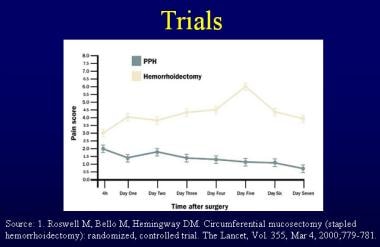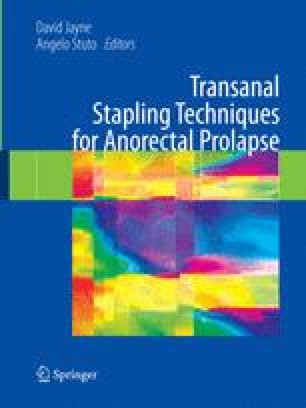
Randomised controlled trial between stapled circumferential mucosectomy and conventional circular hemorrhoidectomy in advanced hemorrhoids with external mucosal prolapse. Boccasanta P, Capretti PG, Venturi M, et al. Circumferential mucosectomy (stapled haemorrhoidectomy) versus conventional haemorrhoidectomy randomised controlled trial. Mehigan BJ, Monson JR, Hartley JE, Stapling procedure for haemorrhoids versus Milligan-Morgan haemorrhoidectomy: randomized controlled trial, Lancet 2000 355: 782-5.ĩ. Persistent pain and fecal urgency after stapled hemorrhoidectomy. Cheetham MJ, Mortensen NJ, Nustorm PO, et al. Surgical treatment of mucosal prolapse and hemorrhoids by stapler, Proceedings of the 6th World Congress of Endoscopic Surgery, Rome, Italy, June 3-6, 1998.ħ. Longo A, Treatment of hemorrhoidal disease by reduction of mucosa and hemorrhoidal prolapse with circular stapling device a new procedure, Proceedings of the 6th World Congress of Endoscopic Surgery. Senagore AJ, Singer M, Abcarian H, et al, A prospective, randomized, controlled multicenter trial comparing stapled hemorrhoidopexy and Ferguson hemorrhoidectomy: perioperative and one-year results.

Stapled hemorrhoid-opexy vs Harmonic scalpel hemorrhoidectomy: a randomized trial., Dis Colon Rectum 2005 48:1213-9,Ĥ. Practice parameters for the management of hemorrhoids (revised), Dis Colon Rectum 2005 48: 189-94.ģ. Jayaraman S, Colquhoun PH, Malthaner RA, Stapled versus conventional surgery for hemorrhoids. Because of the rather high urinary retention rate, SHD should not be performed under spinal anesthesia as a day-case surgery.ġ. The keys of success are proper patient selection and good surgical technique. This study demonstrates that the previously published favorable results of SHD can be reproduced in Thai patients. Stapling technique also reduces the length of hospital stay. No serious complications after SHD were found.Ĭonclusions: Our results confirm that SHD is simple (shorter operative time), safe (less postoperative pain and less complications) and effective (low recurrent symptoms). SHD group developed less recurrent bleeding than CHD group (1.5% vs 9.1% p <0.05). Overall recurrent hemorrhoidal symptoms were similar between the two groups after median follow-up period of 34 months (3-77 months). Postoperative complication rates especially urinary retention were lower in SHD than CHD group (36.8% vs. Postoperative hospitalization for one day was more common in SHD than CHD group (81.9% vs 20.4% p <0.05). Mean operative time was shorter in SHD than CHD group (17 vs 35 minutes p <0.05). SHD group required less analgesic consumption than CHD group (58.3% vs 100% p<0.05). In CHD group (N= 88), 36 were male (41%) and 52 were female (59%) with median age of 47 years (22-79 years). Results: In SHD group (N= 204), 96 were male (47%) and 108 were female (53%) with median age of 51 years (20-80 years).

All procedures were performed under spinal anesthesia and in jackknife position. We compared these data including 88 SHD using PPH-01 performed between October 2000 and December 2003 with 88 CHD from our previous study. Patients and Methods: From January 2004 to December 2006, 116 patients underwent SHD using PPH.03. Objective: The aim of this study was to analyze the results of our 6-year experience of SHD in Thai patients and to compare with our previous study.

We have previously studied and retrospectively compared hemorrhoidectomy by stapled technique (n = 88) and closed hemorrhoidectomy (n =88). There are also 5 systematic reviews of randomized trials comparing SHD and conventional hemorrhoidectomy. There are 25 randomized clinical trials comparing SHD with open hemorrhoidectomy and 6 randomized clinical trials comparing SHD with closed hemorrhoidectomy (CHD). Nowadays, there are sufficient evidences of its benefits. Stapled hemorrhoidectomy (SHD) is a relatively new technique introduced in 1998. Division of General Surgery, Unit B, Department of Surgery, Faculty of Medicine, Ramathibodi Hospital, Mahidol University, Bangkok, Thailandīackground: Hemorrhoidal disease is one of the most common anorectal disorders worldwide.


 0 kommentar(er)
0 kommentar(er)
